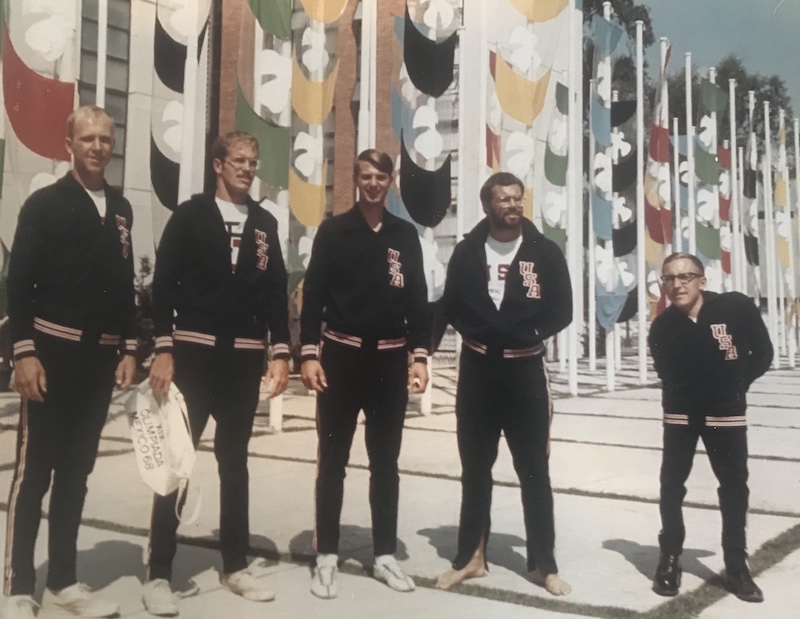More than 90 people Zoomed in Sunday, June 14 for the memorial celebration for John Hartigan, the much beloved coxswain whose raunchy sense of humor and big voice (belying his size) inspired minions to not only do their best but also love the sport of rowing. He died June 8 at age 80.
Donna Hartigan, his wife, said: “His sharp mind, quick wit and hilarious sense of humor made us see past [his physical issues] so that we saw a man. He wanted to be the competitive athlete who could win. He needed all of you to help. I thank all of you for this beautiful gift you gave my husband.”
Howard Greenberg: “He gave us the gift.”
Bob Zagunis: “He provided calmness and steadiness and consistency, whether getting ready for a practice or the Olympic trials. He helped keeps us calm, loose and steady which contributed to our success. He also understood there are things you can control and things you can’t control.”
Zagunis closed with a quote from Rudyard Kipling which he said epitomized Hartigan:
If you can meet with triumph and disaster
And treat those two impostors just the same

Lyman Perry: My first encounter with John was 60 years ago on the dock. I heard this raucous voice, who finished saying , “Let’s get out and beat the bastards” – and out comes Hartigan with the freshman Penn boat.
Perry recalled a race in which, 500 meters before the finish, the boat experienced a “boat-stopping crab” [when the oar gets sucked into the water, threatening to tip the boat]. As the boat belatedly crossed the finish line, the announcer said, “Let’s give a hand to the valiant crew.”
John, said Perry, replied with “the middle finger salute.”
Alan Robinson: “He was cox for the two most important rows I ever had, and they weren’t for the Olympics. They were just rows.”
The first happened when Robinson was about to give up on rowing at the end of his sophomore year at Penn. “I had the good fortune to be put in a boat with John that day. He made rowing fun and that moment changed my life in that I rowed my junior and senior years.”
Then, for the next 36 years, he did not get in a boat. After deciding to try it again, “I walk to the dock and I hear The Voice say, ‘Hey, Big Al!’ It felt good.” Out on the Schuylkill that day, another boat suggested they race. “John, with a conspiratorial voice, said, ‘This is what we’re going to do… “ and that’s when I fell in love with rowing again.”
Those at John’s memorial told so many stories about how he powered through his physical issues — the aftermath of his birth with spina bifida – deformed back, a leg shorter than the other, a special boot and difficulty walking. “His mind was different from his body,” said Dave Krmpotich who spoke of his surprise, in John’s later years, that he didn’t have a handicapped sticker for his car to make parking easier. Dave suggested he get one and later noticed that John had, in fact, gotten a sticker.
“I thought he got that sticker for himself, but I learned at his funeral that he got the sticker for Donna.”
Jim Dietz, rowing stroke and face to face with John in the coxswain seat, told of rowing in a gale, with waves “capping like crazy. I feel John, who can’t swim, grab my foot. ‘See this boot,’ he said. ‘If we go down, you grab it. I’m at the other end.”
Mike Cipollone, a coxswain himself, had brought John into Monsignor Bonner High School as a coxswain coach. Mike remembers him boosting a sense of authority in the small, lightweight kids seeking to cox, telling them: “You’re the king! You’re the admiral!”
Mike asked those coxswains, now in their 30s and 40s, what lessons they had learned from John. One said, “He pulled me aside and told me to take more command of the boat – and he gave me chapstick because he noticed my lips were chapped.”
Another said, “We raced hard but he made fun of us harder.”
Another: “Trust builds fast crews. When a coxswain builds trust with their crew, they can demand more from them.”
And: “He taught me to take care of the equipment. Equipment doesn’t lose races. Bad cosxwains lose races.”
It was John Hartigan’s blistering sense of humor that made all the difference to so many.
Kelly Goldstein, John’s daughter, remembers playing under the bleachers at the reviewing stand as a kid. She knew when her dad’s boat was coming because she’d hear a booming “EXPLETIVE! EXPLETIVE! and the whole crowd roared with laughter. That was John Hartigan coming down the river.”

show Hartigan the bronze Head of Schuylkill Regatta award in his name. Photo Dotty Brown
Steve Goldstein Kelly’s husband, will never forget his laugh. “It was a whole body experience, the kind of laugh you always remember and take with you.”
Bryan Volpenhein, now head coach for Penn’s heavy weight crew, said that a locker would be dedicated each year to a Penn oarsman who best exemplifies John’s spirit. “I only met him once. But hearing these stories shows how impactful having someone like John is on a team.”
When John was no longer able to make it to the river, his dozens of friends launched an annual breakfast at his retirement home. And last fall they raised money to name a trophy in his honor.
Said his wife, Donna, “You honored him in his lifetime. And for all the effort he put out, it all came back to him.
“He could give love,” she said. “You could take it, and he could receive it back”